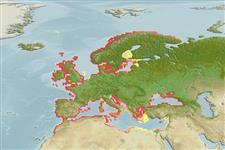Common names from other countries
>
Syngnathiformes (Pipefishes and seahorses) >
Syngnathidae (Pipefishes and seahorses) > Syngnathinae
Etymology: Syngnathus: Greek, syn, symphysis = grown together + Greek, gnathos = jaw (Ref. 45335).
More on author: Linnaeus.
Environment: milieu / climate zone / depth range / distribution range
Ecología
marino; salobre demersal; no migratorio; rango de profundidad 1 - 20 m (Ref. 35388). Temperate; 8°C - 24°C (Ref. 4944); 71°N - 30°N, 11°W - 42°E
Eastern Atlantic: Vardø, Norway, Baltic Sea and the British Isles to Morocco. Also throughout the Mediterranean, Black Sea and Sea of Azov. Record off Ghana is still questionable (Ref. 4509).
Tamaño / Peso / Age
Maturity: Lm ? range ? - ? cm
Max length : 35.0 cm TL macho / no sexado; (Ref. 35388)
Short description
Morfología | Morfometría
Snout is compressed and taller than the eye diameter (Ref. 35388) and anterior trunk rings not fused ventrally (Ref. 59043).
Usually found along the coasts and estuaries at a temperature range of 8° to 24°C (Ref. 4944). Often associated with Zostera or other vegetation (Ref. 6733). Ovoviviparous (Ref. 205). The male carries the eggs in a brood pouch which is found under the tail (Ref. 205). Spawns in summer (Ref. 35388).
Male carries the eggs in a brood pouch (Ref. 205, 53335).
Dawson, C.E., 1986. Syngnathidae. p. 628-639. In P.J.P. Whitehead, M.-L. Bauchot, J.-C. Hureau, J. Nielsen and E. Tortonese (eds.) Fishes of the North-eastern Atlantic and the Mediterranean. Volume 2. Unesco, Paris. (Ref. 6733)
IUCN Red List Status (Ref. 130435)
CITES (Ref. 128078)
Not Evaluated
Threat to humans
Harmless
Human uses
Pesquerías: sin interés; Acuario: Acuarios públicos
Más información
ReferenciasAcuiculturaPerfil de acuiculturaRazasGenéticaElectrophoresesheritabilidadEnfermedadesProcesamientoMass conversion
Herramientas
Special reports
Download XML
Fuentes de Internet
Estimates based on models
Preferred temperature (Ref.
115969): 8.8 - 19.6, mean 14 (based on 1098 cells).
Phylogenetic diversity index (Ref.
82804): PD
50 = 0.5000 [Uniqueness, from 0.5 = low to 2.0 = high].
Bayesian length-weight: a=0.00026 (0.00020 - 0.00034), b=3.20 (3.14 - 3.26), in cm Total Length, based on LWR estimates for this species (Ref.
93245).
Nivel trófico (Ref.
69278): 4.3 ±0.7 se; based on diet studies.
Resiliencia (Ref.
120179): Medio, población duplicada en un tiempo mínimo de 1.4-4.4 años (K=0.56; tm=1; Fec=100).
Fishing Vulnerability (Ref.
59153): Low to moderate vulnerability (25 of 100).
